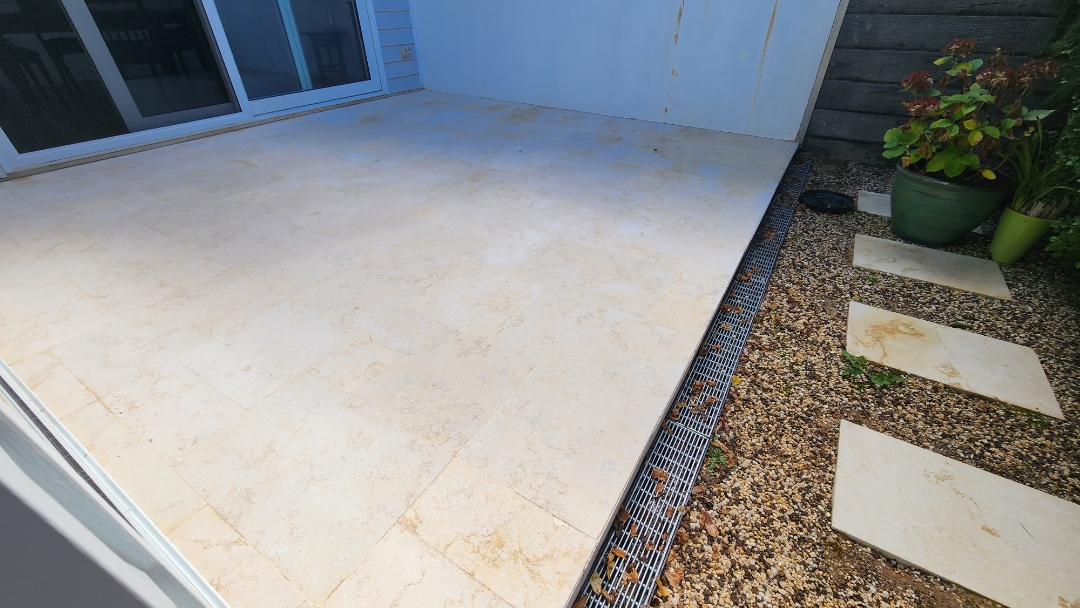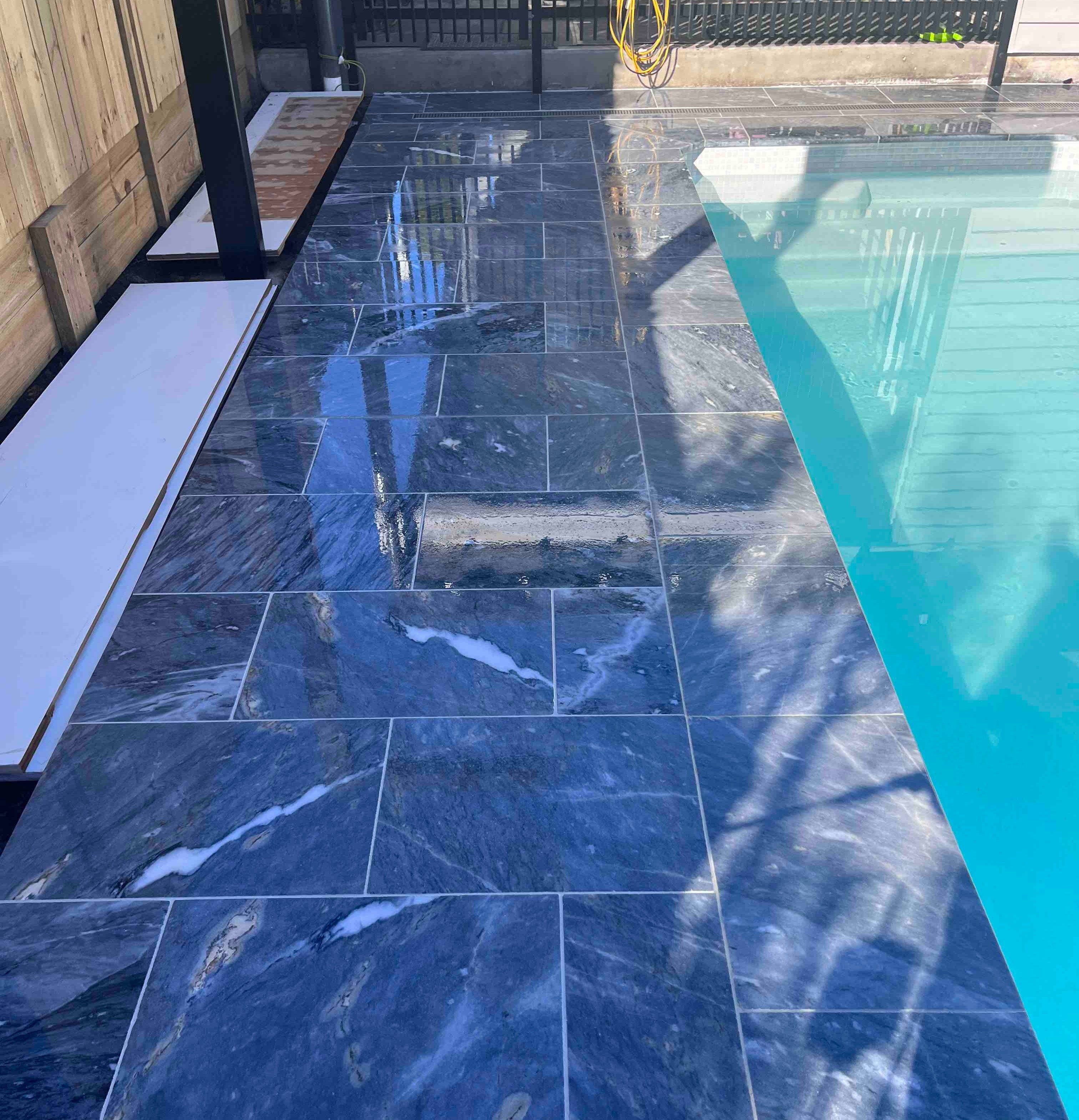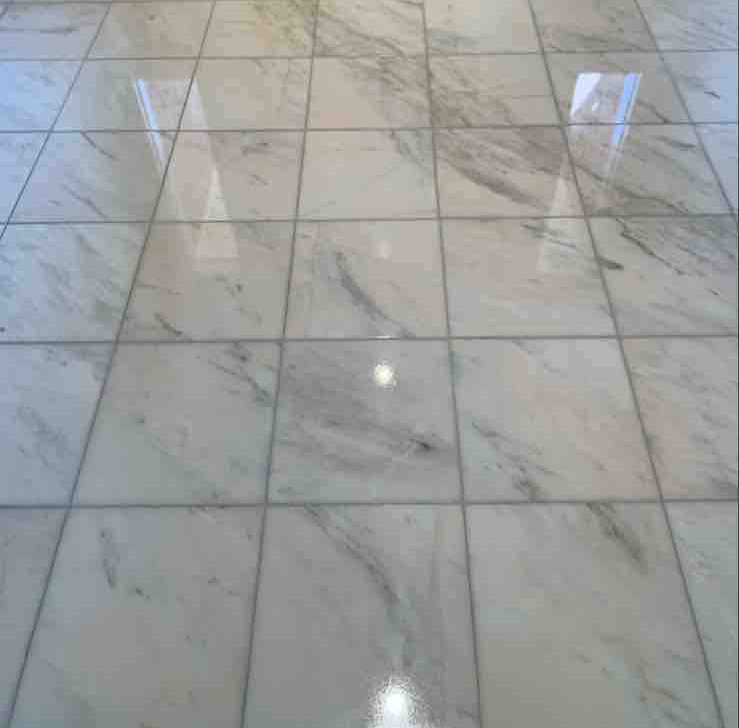With numerous sealers available in the market, it can be overwhelming to determine the best choice for your Slatestone. Which sealer will effectively work? Which one won't? Which sealer is most suitable for your specific situation, and how do they vary?
Sealing and Protecting Slate
Sealing is essential to prevent moisture carrying stains from penetrating your Slatestone. Slatestone wall and floor tiles possess varying degrees of absorbency. By pouring a teaspoon of water on an unsealed Slatestone tile, you can observe its rapid absorption, highlighting the potential for stains to penetrate. This is due to Slatestone's natural porosity, characterized by small pin-holes and open fissures within its texture.
When utilized for flooring and walls, Slatestone tiles necessitate meticulous preparation, sealing, and ongoing maintenance.
Unsealed Slatestone quickly absorbs moisture
Slatestone is a porous material. Without proper sealing, dirt and stains can easily infiltrate the stone's pores, as well as the grout.
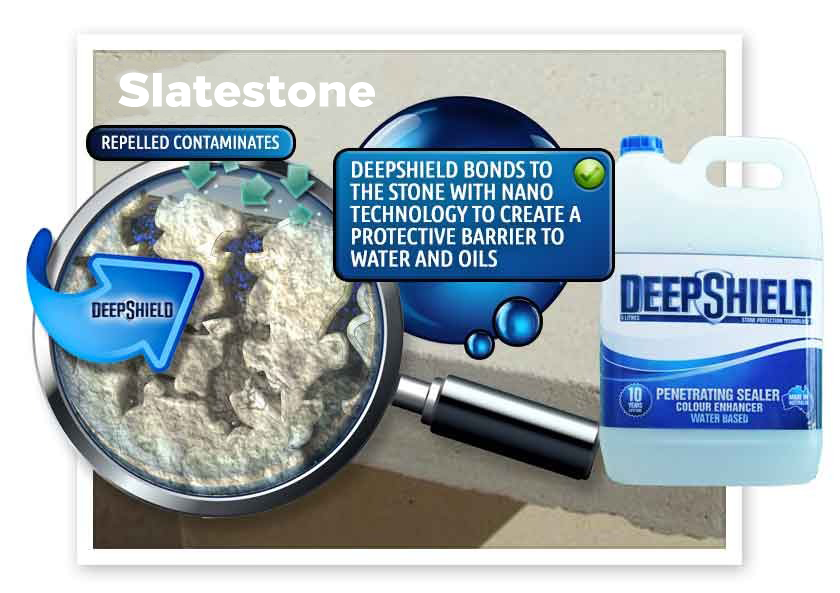 Sealing Slatestone offers numerous benefits:
Sealing Slatestone offers numerous benefits:
- Stain prevention
- Prevent discolouration
- Protection of Slatestone
- Surface enhancement
- Facilitates easier regular maintenance
When Slatestone is properly sealed, cleaning becomes effortless. Regular sweeping and occasional washing with a soft cloth and soap and water can help maintain Slatestone's pristine condition for years to come. Sealing Slatestone with a high-quality stone sealant like Penetrating Sealer can prolong the lifespan of your stone, while also safeguarding it against moisture, mold, and calcification.
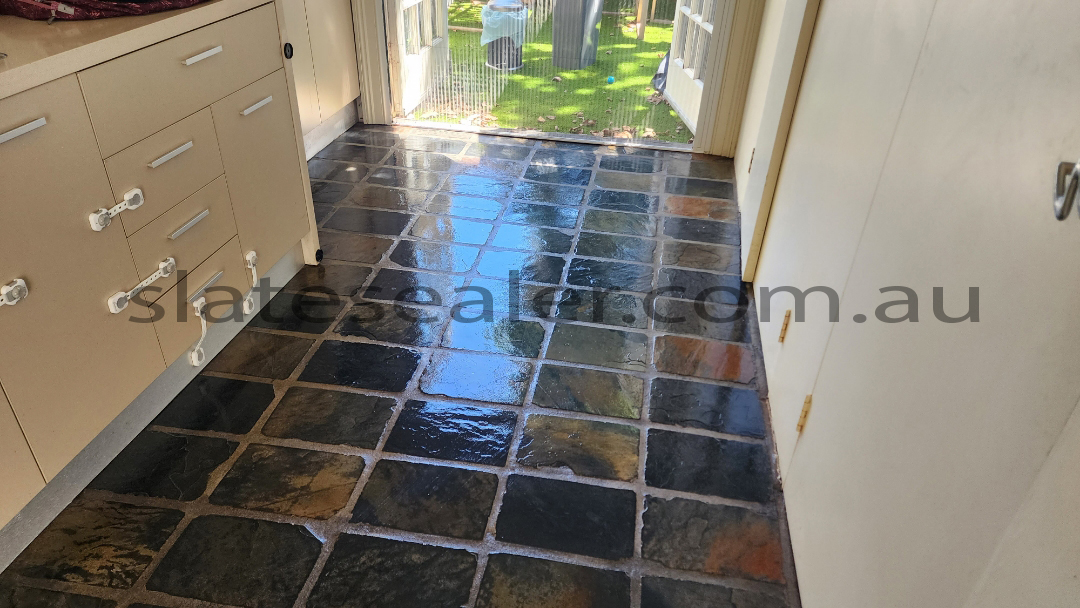
Once sealed, cleaning Slatestone becomes effortless!
Selecting the Ideal Sealer
Impregnating sealers are carried in a liquid base, which can be either water or solvent-based. These sealers penetrate the small pinholes and open fissures just below the surface of the Slatestone. Once absorbed, the carrier evaporates, leaving the sealer behind, which chemically reacts with the surface pores to create a breathable protective barrier.
Using an impregnating sealer shields your Slatestone surface and grout from absorbing stains, making cleaning and maintenance much simpler. While some sealers may last only a few years, Australia's range of impregnating water-based sealers can last for up to 15 years.
Solvent-based sealers are typically reserved for extreme cases and are generally not recommended. Water-based sealers utilize modern technologies like nanotechnology and fluoro-polymer technology, rendering many old solvent-based products obsolete.
Water-based sealers often emit toxic fumes, which can pose health hazards, and when applied, may require the area to be vacated for up to 48 hours. Solvents can also cause damage to property, such as skirting boards, doors, paint, and adjacent areas.
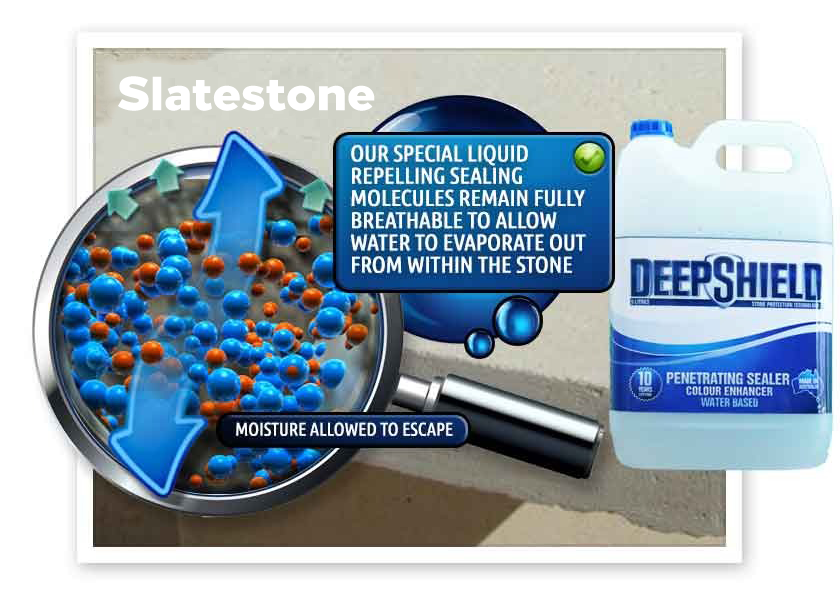
- For optimal protection against oil and water-based stains, as well as to preserve the appearance and slip resistance of your Slatestone, it's advisable to seal it with a premium-quality, invisible, fully breathable impregnating sealer.
Generally impregnating sealers are suitable for both interior and exterior applications, including wet areas like kitchens, bathrooms, laundries, patios, and around swimming pools. This ensures that damaging moisture is prevented from being trapped within the stone, maintaining its integrity over time.
Properties ofImpregnating Sealer:
- Penetrates into the Slatestone substrate and bonds its protection to the walls within the micro-pore structure, enabling total vapor transmission through the stone.
- Does not alter the color or sheen of the stone.
- Does not necessitate reapplication after each cleaning.
- As the sealer does not linger on the surface, it is not prone to scratching or scuffing. With no surface coating to degrade, the sealer does not need to be reapplied as frequently as topical sealers.
- A penetrating colour enhancing sealer is formulated to enrich and bring out the natural beauty of Slatestone surfaces.
- Penetrating Colour Enhancer is an excellent choice for Slatestone for two primary reasons. Firstly, it is an impregnating sealer, meaning it deeply penetrates the pores of the Slatestone, offering durable protection against embedded dirt. Secondly, it contains color-enhancing properties that intensify the natural hues present in the Slatestone.
- Extended lifespan as the protection is integrated within the substrate, rather than just on the surface.
- Resistant to UV light, making it suitable for both outdoor and indoor applications.
- Allows the Slatestone to breathe, allowing trapped moisture to escape.
- Surface remains non-slippery.
- Enhances the longevity of Slatestone.
- Unsealed slatestone surfaces exhibit high porosity and are susceptible to permanent staining from spills. Therefore, sealing is essential to protect your slatestone against undesired staining and deterioration.
- If you have a slatestone tiled floor, you'll observe its quick absorption of liquids and susceptibility to staining. Thus, sealing becomes essential to safeguard against such occurrences.
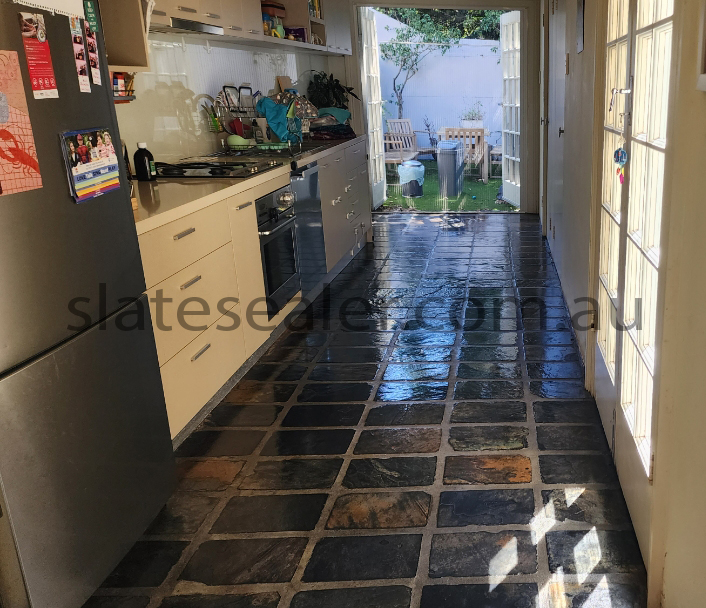 Applying a durable penetrating sealer will not only safeguard against staining but also prolong the lifespan of your Slatestone, making routine maintenance considerably simpler.
Applying a durable penetrating sealer will not only safeguard against staining but also prolong the lifespan of your Slatestone, making routine maintenance considerably simpler.
Impregnating penetrating sealants deeply penetrate the Slatestone substrate, permeating the microscopic pinholes and open fissures that constitute its natural texture.
A transparent impregnating sealer preserves the original look and texture of your sealed Slatestone, while maintaining the stone's ability to release vapor and offering greater durability compared to film-forming sealers.
Key Benefits:
Topical sealers
Topical sealers produce a glossy protective coating on the surface of slatestone and masonry surfaces. Conversely, penetrating sealers penetrate the surface of slatestone, safeguarding the walls of each individual pore within its structure.
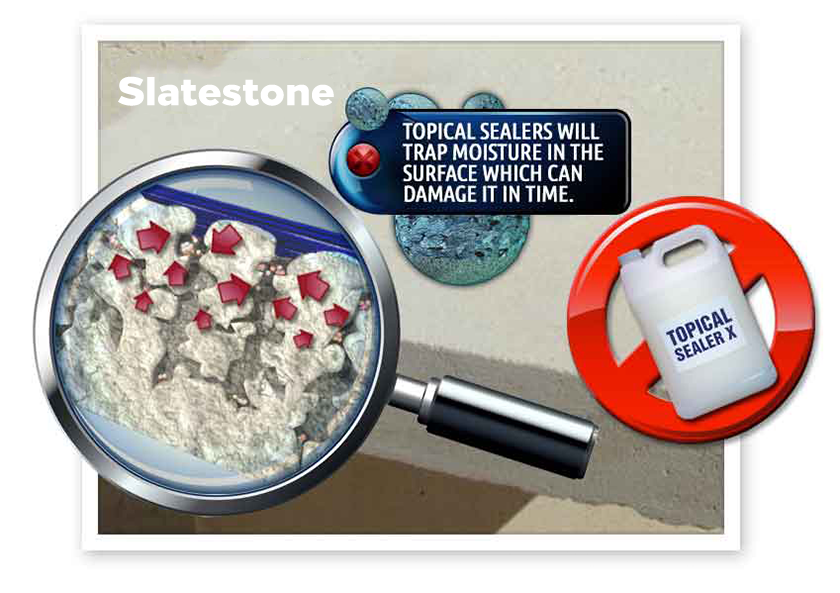
Drawbacks of Topical Sealers:
- Requires frequent reapplication
- Must be entirely removed before reapplication
- Prevents the stone from breathing, trapping moisture within
- Forms a shiny surface film susceptible to scratches and scuffs
- May increase slipperiness when wet
- Alters the natural color of the slatestone
Particularly, substances like red wine, oil, and grease can cause damage that might necessitate heavy resurfacing machinery for removal when it comes to slatestone. While sealing slatestone cannot entirely prevent liquids from being absorbed, it does offer a window of time to wipe away spills before permanent damage sets in.
Cleaning and maintaining unsealed slatestone flooring can prove challenging, as surface contaminants swiftly permeate the porous slatestone structure, making them tough to eradicate.
It is highly recommended to apply a deep penetrating impregnating sealer to slatestone floors, ensuring long-lasting protection and stain resistance.
The most effective penetrating sealers on the market today are Australian-made. They produce non-solvent sealers that are easy to apply using a brush, roller, or sprayer, and they dry within a few hours. These deep-penetrating slatestone sealers are available in a dry, invisible finish or with a slightly wet, colour enhancing effect, boasting a lifespan of 10 to 15 years.
Pre-Sealing Preparation
- Before sealing any surface, ensure it's thoroughly clean and in the desired condition, as removing stains post-sealing without stripping away the sealer can be challenging. Avoid using acidic cleaners on slatestone as they can cause damage.
- Slatestone must not have any other coating such as wax or a topical sealer before it's sealed, requiring the removal of any existing coatings beforehand.
- The floor must be thoroughly dry before applying most sealers to slatestone surfaces.
- Select a high-quality, long-lasting deep penetrating, impregnating sealer for slatestone..
- Thoroughly clean your slatestone before application to prevent dust and debris from being trapped once sealed.
- Ensure correct application and the appropriate number of coats.
- Keep in mind, with stone sealers, you get what you pay for.
- Enhanced durability against stains
- Superior oil and water repellency
- Preservation of the natural surface appearance
- Non-film forming properties
- Breathability
- Easy cleaning and maintenance
The number of coats required will depend upon the porosity of the slatestone, with a second or third coat of sealer possibly necessary. Once sealed, the tile will resist staining, and prompt removal of any stains should leave no evidence on the surface of the stone.
Slatestone will vary in hardness and is inherently porous - if you apply a small amount of water to an unsealed slatestone surface, it will be absorbed quickly. The porosity of slatestone is also affected by the finish - for instance, highly polished slatestone is less porous compared to slatestone with a honed (matte) finish.
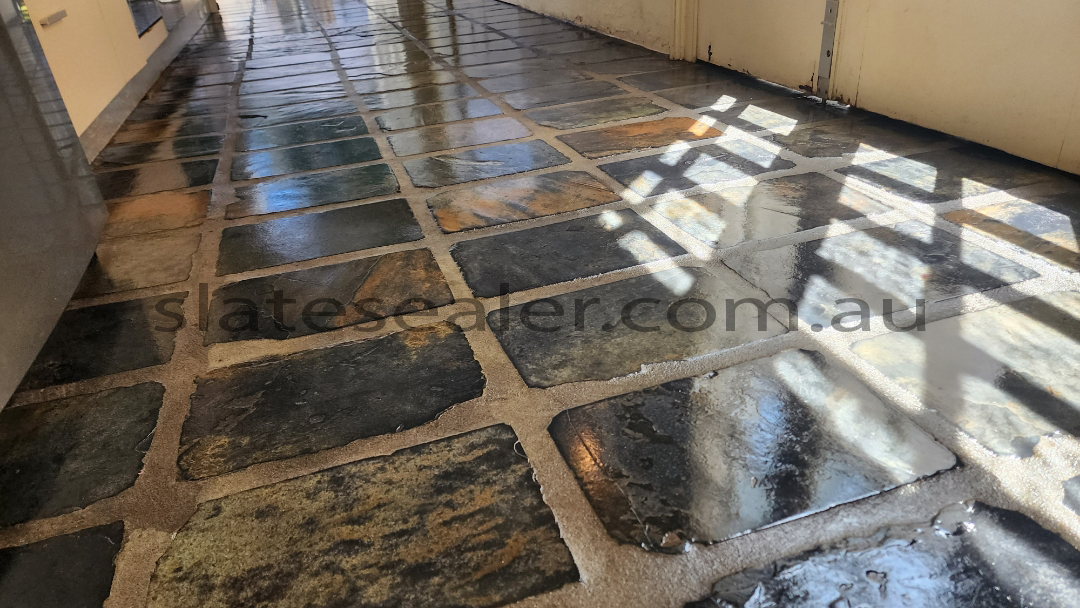
Fluoro-chemical technology incorporated into GOLD represents the pinnacle of advancement, offering unparalleled long-term protection against water and oil-based stains. Its micro-molecular formula chemically interacts with the stone surface, forming a bond stronger than conventional sealers.
This technology simplifies Slatestone care, ensuring:
Overall, GOLD preserves the beauty of your Slatestone with lasting effectiveness.
Some Valuable Advice:
Choose an experienced company with specialized equipment and expertise to correctly seal and maintain your slatestone once installed.
It is important to keep your sealed slatestone clean, wipe up spills quickly, and clean periodically.
Professional cleaning not only eliminates surface dirt but also extracts embedded dirt from within the pores of slatestone.
Reach out to a professional stone floor maintenance company possessing the necessary equipment and knowledge to ensure your valuable slatestone surfaces maintain their desired appearance.
Tile Cleaners Australia and StoneMaster are part of a network of independent Accredited Applicators fully trained in the correct application of slatestone care products. They offer comprehensive services including thorough cleaning of the slatestone area, product application, and after-sales care.
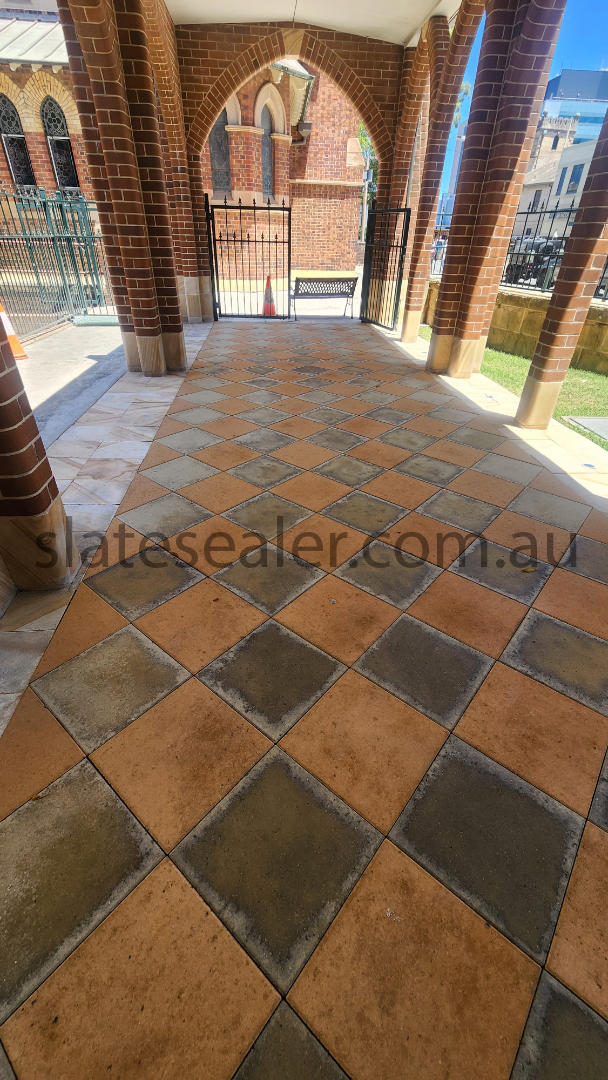
- Tile Cleaners Australia stands as the premier tile care provider in Australia, offering services such as tile and grout cleaning, tile sealing, tile stripping and sealing, tile regrouting, grout color sealing, and minor tile repairs.
- StoneMaster adopts a diagnostic approach to each unique situation, conducting a comprehensive analysis and selecting the best restoration method followed by appropriate maintenance procedures to ensure exceptional results.
Ensuring your slatestone is thoroughly cleaned before sealing is important as you may seal in old stains or dust and debris embedded in the stone, resulting in the sealer needing to be stripped and resealed.
Applying a sealer that is not suitable or of sufficient quality will result in slatestone surfaces you aren't completely satisfied with.



